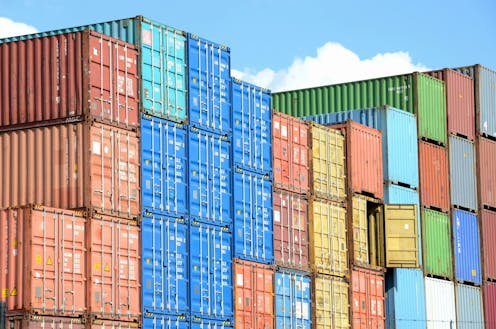Business basics: what is comparative advantage?
- Written by Martin Richardson, Professor, Australian National University

For the best part of two centuries, the principle of “comparative advantage” has been a foundation stone of economists’ understanding of international trade, both of why it occurs in the first place and how it can be mutually beneficial to participants.
The principle largely aims to explain which countries produce and trade what, and why.
And yet, even 207 years on from political economist David Ricardo’s first exposition of the idea, it is still frequently misunderstood and mischaracterised.
One common oversimplification is that comparative advantage is just about countries making what they’re best at.
This is a bit like saying Macbeth is a play about murder – yes, but there’s quite a bit more to it.
Costs represent missed opportunities
Comparative advantage does suggest that a country should produce and export the goods it can produce at a lower cost than its trading partners can.
But the most important detail of the principle is that cost is not measured simply in terms of resources used. Rather, it is in terms of other goods and services given up: the opportunity cost of production.
An asset like land used for agriculture has an enormous range of other potential productive purposes – such as growing timber, housing or recreation. A production decision’s opportunity cost is the value forgone by not choosing the next best option.
Ricardo’s deep insight was to see that focusing on relative costs explains why all countries can gain from comparative advantage based trade, even a hypothetical country that might be more efficient, in resource-use terms, in the production of everything.
Imagine a country rich in capital and advanced technology that can produce anything using very few resources. It has an absolute advantage in all goods. How can it possibly gain from trading with some far less efficient country?
The answer is that it can still specialise in those goods at which it is “most best” at producing. That’s where its advantage relative to other countries is greatest.
Who’s best at producing wheat?
Here’s an example. In 2023, Canada’s wheat industry produced about three tonnes[3] of wheat per hectare. But across the Atlantic, the United Kingdom yielded much more per hectare – 8.1 tonnes[4]. So which country has a comparative advantage in wheat production?
The answer is actually that we can’t say, because these numbers are about absolute efficiency in terms of land used. They tell us nothing about what has been given up to use that land for wheat production.
The plains of Saskatchewan, Alberta and Manitoba are great for growing wheat but have few other uses, so the opportunity cost of producing wheat there is likely to be pretty low, compared with scarce land in crowded Britain.
It’s therefore very likely that Canada has the comparative advantage in wheat production, which is indeed borne out by its export data.
Why does it matter?
We have recently seen a lot in the news about industrial policy: governments actively intervening in markets to direct what is produced and traded. Current examples include the Future Made in Australia proposals and the US Inflation Reduction Act. Why is comparative advantage relevant to these discussions?
Well, to the extent that a policy moves a country away from the pattern of production and trade governed by its existing comparative advantage, it will involve efficiency losses – at least in the short term.
Resources are allocated away from the goods the country produces “best” (in the terms discussed above), and towards less efficient industries.
It’s important to note, however, that comparative advantage is not some god-given, immutable state of affairs.
Certainly, some sources of it – such as having a lot of natural gas or mineral ore – are given. But innovation and technical advances can affect costs. A country’s comparative advantage can therefore change or be created over time – either through “natural” changes or through policy actions.
The big hard-to-answer question concerns how good governments are at doing that: will claimed future gains be big enough to offset the losses?
Does everybody gain from international trade?
Supporters of free trade are often accused of arguing that everybody gains from trade. This was true in Ricardo’s early model, but pretty much only there. It has been understood for centuries that within a country there will typically be gainers and losers from international trade.
When economists talk of the mutual gains from comparative-advantage-based trade, they’re referring to aggregate gains – a country’s gainers gain more than its losers lose.
In principle, the winners could compensate the losers, leaving everybody better off. But this compensation can be politically difficult and seldom occurs.
But the concept can’t explain everything
The theory of comparative advantage is a powerful tool for economic analysis. It can easily be extended to comparisons of many goods in many countries, and it helps explain why there can be more than one country that specialises in the same good.
But it isn’t economists’ only basis for understanding international trade. A great deal of international trade in recent decades, particularly among developed nations, has been “intra-industry” trade.
For example, Germany and France both import cars from and export cars to each other, which cannot be explained by comparative advantage.
Economists have developed many other models to understand this phenomenon, and comparative-advantage-based trade is now only one of a suite of tools we use to explain and understand why trade happens the way it does.
Read more: Australia is playing catch-up with the Future Made in Australia Act. Will it be enough?[8]
References
- ^ Spencer Davis/Unsplash (unsplash.com)
- ^ Adie_Pulung/Shutterstock (www.shutterstock.com)
- ^ three tonnes (agriculture.canada.ca)
- ^ 8.1 tonnes (www.gov.uk)
- ^ Nancy Anderson/Shutterstock (www.shutterstock.com)
- ^ IM Imagery/Shutterstock (www.shutterstock.com)
- ^ PR Handout Image/AAP (photos.aap.com.au)
- ^ Australia is playing catch-up with the Future Made in Australia Act. Will it be enough? (theconversation.com)
Authors: Martin Richardson, Professor, Australian National University
Read more https://theconversation.com/business-basics-what-is-comparative-advantage-230869







